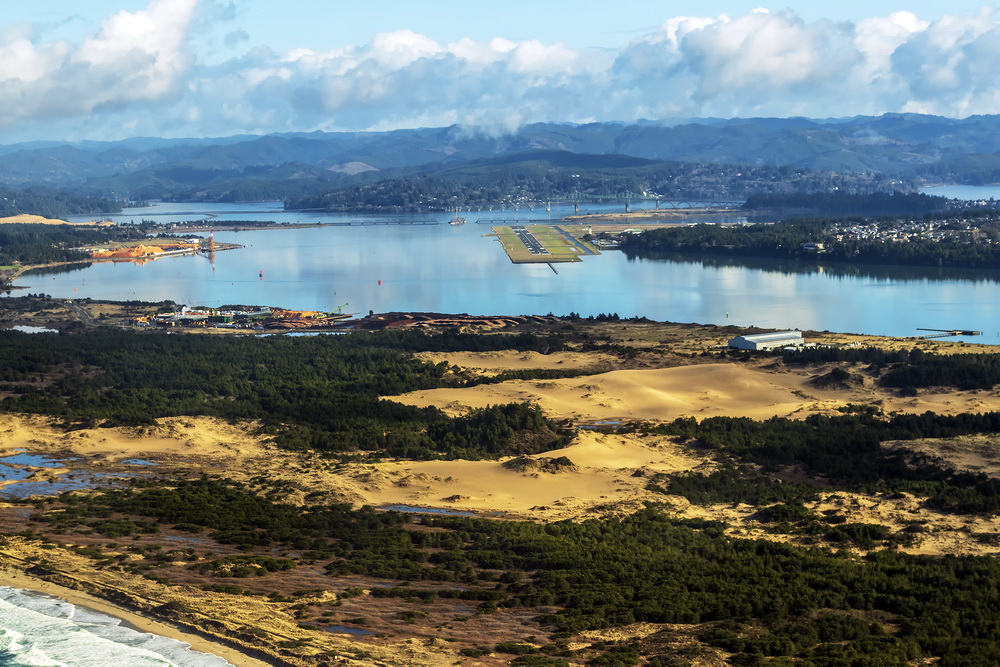Resources > News
State Denies Jordan Cove’s ‘Consistency’


The long battle over the proposed Jordan Cove LNG (liquefied natural gas) export facility entered a new phase recently, with the state’s denial of the project as being inconsistent with Oregon’s coastal management policies. A scheduled decision by the Federal Energy Regulatory Commission (FERC) on federal authorization of the project was then pulled back, when one commissioner voted a temporary “no” to allow time to consider Oregon’s reasons for rejecting the application. The hearing at which the decision was to be made was then scheduled for March 19. Now, due to coronavirus concerns, the public hearing has been cancelled. Instead, FERC will issue a “Notational Order” at some point, simply announcing its decision–this could come at any time.
FERC’s action in blocking the proect was temporary, and won’t be important unless the commissioners shock everyone by actually denying authorization for the project.
The state decision, though, is highly significant. Oregon’s Department of Land Conservation and Development (DLCD) ruled that Jordan Cove did not qualify for state certification under the Coastal Zone Management Act (CZMA), which requires that federal actions in coastal zones be consistent with state coastal management programs. DLCD is charged with performing what’s called a “consistency review,” which evaluates whether the project complies (i.e., is “consistent”) with the enforceable policies of the state’s approved Coastal Management Program (CMP). DLCD pointed out that Jordan Cove had failed to obtain state permits concerning water quality and dredging, among other things. While Jordan Cove has obtained local land use approvals, Oregon Shores is appealing four of these, and intervening in a fifth in support of the Confederated Tribes of Coos, Lower Umpqua and Siuslaw Indians, the lead appellant in that case. Clearly, the Jordan Cove Energy Project, which is really Canadian multinational giant Pembina, is a long way from even obtaining the local land use permits it would need to demonstrate that it complied with Oregon’s coastal management regulations.
Oregon Shores delivered comments to DLCD while it was considering Jordan Cove’s application for a “consistency” acknowledgment, laying out in systematic detail the many ways in which the project feel short of grounds for approval. We also signed onto a broader statement by a range of conservation groups calling for DLCD to find that Jordan Cove had not obtained the necessary state and local approvals and was thus not in compliance with CZMA. That is exactly what DLCD found, and stated in very clear terms.
DLCD’s letter to FERC, conveying its decision, lists applicable Oregon policies and standards and how Jordan Cove has failed to meet them, either because a permit application was denied, withdrawn, or never submitted, or because consistency could not be established because of “insufficient information.” The agency had warned Pembina that these permits were necessary. In denying Jordan Cove’s consistency with state requirements, DLCD focuses on potential negative impacts to water resources. The potential effects of the project in damaging water quality in the Coos Bay estuary is one of the areas that Oregon Shores has emphasized in comments directly to DLCD, as well as to the Department of Environmental Quality and local jurisdictions.
Among the other risks cited by DLCD (among many) are the impact of dredging on water quality, including the possibility of stirring up toxic chemicals from the estuary’s bottom sediments; disturbance of marine mammals by LNG vessels; the harm that could be done to the commercial and recreational fishing industries by the required 500-yard security zone around LNG tankers, which would effectively shut down passage for other vessels for long periods; and the safety concerns that would be raised by the presence of a potentially explosive facility in an earthquake and tsunami zone. These are all matters that Oregon Shores has raised many times in testimony.
The agency also noted that Jordan Cove has failed to provide adequate information about its proposals to mitigate for the impacts of the project (by improving habitat elsewhere), and to demonstrate that such mitigation would be successful. Oregon Shores has in particular opposed the destruction of ecologically vital eelgrass beds, and the entirely unsatisfactory plan to mitigate for this impact by creating new eelgrass beds elsewhere, in a manner than is not only unpoven but might actually damage other habitat.
Theoretically, this should block the project. But while this state decision is significant, it is not definitive. The federal government is supposed to honor the state’s findings under CZMA, but we’re in the Trump era, and it seems highly likely that his administration will attempt to abrogate CZMA and steamroller the state. This will bring about a major legal battle, and Oregon Shores will be in the thick of it.
